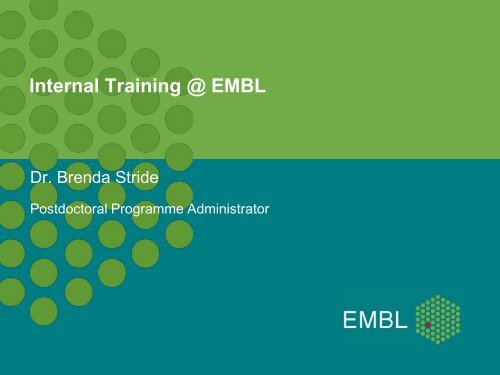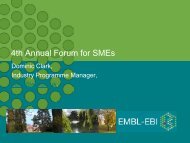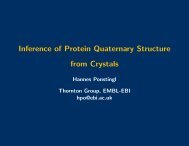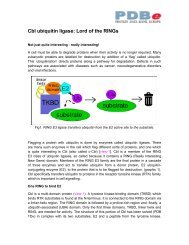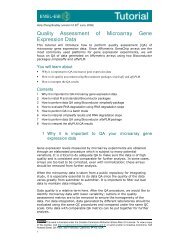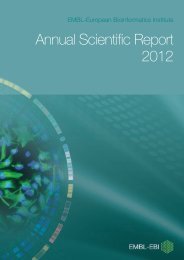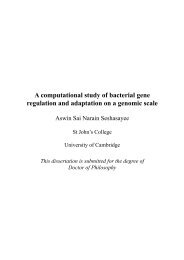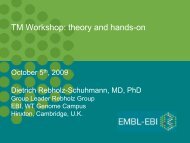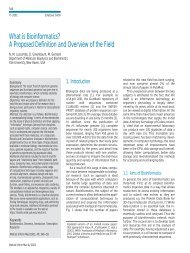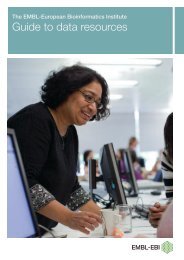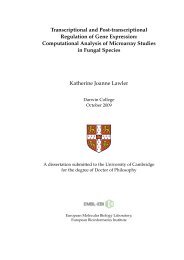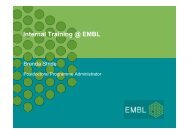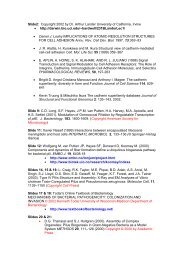Internal Training @ EMBL - European Bioinformatics Institute
Internal Training @ EMBL - European Bioinformatics Institute
Internal Training @ EMBL - European Bioinformatics Institute
You also want an ePaper? Increase the reach of your titles
YUMPU automatically turns print PDFs into web optimized ePapers that Google loves.
<strong>Internal</strong> <strong>Training</strong> @ <strong>EMBL</strong><br />
Dr. Brenda Stride<br />
Postdoctoral Programme Administrator
Who are we at <strong>EMBL</strong><br />
• <strong>European</strong><br />
Intergovernmental<br />
Research<br />
Organisation<br />
<strong>EMBL</strong>-EBI<br />
Grenoble<br />
Hamburg<br />
Heidelberg<br />
Monterotondo<br />
• Founded in 1974<br />
• Five sites in four<br />
countries<br />
• About 1400 in staff;<br />
~ 1100 scientists<br />
- 79% from <strong>EMBL</strong><br />
member states<br />
- representing more<br />
than 60 nationalities<br />
• 20 (+1) Member<br />
States
The Five Branches of <strong>EMBL</strong><br />
Heidelberg<br />
Hamburg<br />
Hinxton<br />
Basic research in<br />
molecular biology,<br />
Administration<br />
EMBO<br />
Structural Biology<br />
DESY<br />
Grenoble<br />
<strong>European</strong> <strong>Bioinformatics</strong><br />
<strong>Institute</strong> (EBI)<br />
Sanger Centre<br />
Monterotondo<br />
Structural Biology<br />
ILL ESRF IBS UVHCI<br />
Mouse Biology<br />
EMMA CNR
<strong>EMBL</strong>’s 20 + 1 Member States<br />
AUSTRIA<br />
BELGIUM<br />
CROATIA<br />
DENMARK<br />
FINLAND<br />
FRANCE<br />
GERMANY<br />
GREECE<br />
ICELAND<br />
IRELAND<br />
ISRAEL<br />
ITALY<br />
LUXEMBURG<br />
NORWAY<br />
PORTUGAL<br />
SPAIN<br />
SWEDEN<br />
SWITZERLAND<br />
THE NETHERLANDS<br />
UNITED KINGDOM<br />
AUSTRALIA (Ass. Member)
What are we doing at <strong>EMBL</strong><br />
<strong>EMBL</strong>’s five missions<br />
• Basic research<br />
• Development of new technologies and instruments<br />
• Technology transfer<br />
• Services to the Member States<br />
• Advanced <strong>Training</strong><br />
5<br />
Helke Hillebrand 03/2009
<strong>Training</strong> at all Levels: EICAT @ <strong>EMBL</strong><br />
<strong>EMBL</strong> International Center for Advanced <strong>Training</strong><br />
EIPOD<br />
<strong>EMBL</strong> International<br />
PhD Programme &<br />
<strong>EMBL</strong> Collaborative<br />
<strong>Training</strong> Programme<br />
<strong>EMBL</strong> Postdoc<br />
Programme<br />
ELLS (<strong>European</strong><br />
Learning Lab for<br />
the Life Sciences)<br />
EMBO <strong>EMBL</strong><br />
Symposia<br />
6<br />
<strong>EMBL</strong> Visitors' & Scholars' Programme<br />
Helke Hillebrand 07/2012<br />
<strong>EMBL</strong> Courses &<br />
Conferences
Predocs<br />
<strong>EMBL</strong> International PhD Programme<br />
EIPP<br />
7<br />
08.10.2012<br />
Helke Hillebrand
Allez, les étudiants!<br />
• The <strong>EMBL</strong> International PhD Programme was founded in 1983 and<br />
will celebrate ist 30th anniversary in 2013<br />
• Since its inception several hundred EIPP students have defended<br />
their PhD-thesis at more than 90 universities<br />
• Since 1997, <strong>EMBL</strong> can award its own PhD degree<br />
60<br />
50<br />
PhD defences since 1997<br />
40<br />
30<br />
20<br />
10<br />
0<br />
8<br />
Helke Hillebrand 10/2012
Key performance indicators of a PhD at <strong>EMBL</strong><br />
• Application rate is at about 25:1<br />
• Predoc to supervisor ratio is on average 2:1<br />
• It takes about 3.5 – 4 years to finish a PhD<br />
• Thesis submission rate of > 95% (predoc data since 1993)<br />
• Majority of EIPP predocs obtains a doctoral degree with<br />
distinction (>75%)<br />
• Broad network of partner universities for joint degrees<br />
• Excellent Predoc publication record<br />
– 90% of predocs of a given class get (a) publication(s) from their PhD<br />
– Predocs publish on average two 1 st author papers on their PhD topic<br />
9<br />
08.10.2012<br />
Helke Hillebrand
Application & eligibility<br />
• Seeking excellent students - based on self-selection<br />
• Application timelines twice a year<br />
• On-line application<br />
• Admission requirements according to rules of national system<br />
• Need 2 academic/scientific references<br />
• National evaluation of application by <strong>EMBL</strong> faculty<br />
• Evaluation of applications by two designated <strong>EMBL</strong> Units<br />
• Invitation of 2-3 candidates per position; about 50 open positions<br />
annually<br />
• “Shared Applicant Pool“ Initiative<br />
10<br />
Helke Hillebrand 03/2009
Admission<br />
• No quota system<br />
• Individual 5-day selection by <strong>EMBL</strong> Faculty:<br />
Initial Admission Assessment (panel interview)<br />
Successful candidates interviewed by 15-20 Group Leaders<br />
• Tandem formation between candidate and supervisor based on<br />
students preferences<br />
• All eligible candidates may enter the waiting list<br />
• Invited candidates may start any time after admission,<br />
preferably latest with the core course in October<br />
11<br />
Helke Hillebrand 03/2009
What does <strong>EMBL</strong> expect from you<br />
• Good grades<br />
• Taking pleasure in interdisciplinary thinking<br />
• A profile matching a group leader‘s expectations regarding the<br />
requirements of a specific project<br />
• Enthusiasm, curiosity, dedication, creativity, diligence ...<br />
• Becoming a valuable team member!<br />
12<br />
Helke Hillebrand 03/2009
Core course<br />
Speak the same scientific language<br />
&<br />
meet your class mates and faculty
Core Course<br />
• Core course at the beginning (~400 contact hours)<br />
• Teaching materials on-line (password protected)<br />
• Eight modules with lectures and practicals taught in an<br />
interdisciplinary fashion<br />
Basic module<br />
Chromatin and Translation (5 days)<br />
Cell Biology (4 days)<br />
Disease Mechanisms and Pathogens (4 days)<br />
Genomics (5 days)<br />
Proteomics and Structural Biology (7 days)<br />
Outstation visit<br />
Developmental Biology and Behavior (4 days)<br />
Evolution (5 days)<br />
• One module on non-scientific bits<br />
• Bioinfomatics course (2 nd year; ~30 contact hours)
Thesis Advisory Committee<br />
(TAC)<br />
Mentoring & Guidance<br />
15<br />
Helke Hillebrand 03/2009
Thesis Advisory Committee<br />
• Your first tailor-made networking opportunity!<br />
• Thesis Advisory Committee (TAC)<br />
Three <strong>EMBL</strong> Group Leaders and one external member<br />
(University Professor)<br />
• Annual TAC meetings<br />
present a written report and discuss annual progress<br />
discuss proposed future work<br />
• 4 years to complete PhD work<br />
16<br />
Helke Hillebrand 03/2009
No need to be a rich student to join the <strong>EMBL</strong><br />
• <strong>EMBL</strong> covers cost for travel and<br />
accommodation for the interview week<br />
• All PhD positions come with generous<br />
fellowships including broad health care<br />
benefits<br />
• <strong>EMBL</strong> reimburses the fees potentially<br />
associated with university registration<br />
• No bench fees!<br />
• After finishing a ‚former‘ Predoc may<br />
continue to stay up to 4.5 years in total<br />
as a ‚bridging Postdoc‘
Status quo EIPP<br />
Graduation ceremony at <strong>EMBL</strong> in December, 2010<br />
18<br />
08.10.2012<br />
Helke Hillebrand
What <strong>EMBL</strong> Predocs did in the past….<br />
19<br />
08.10.2012<br />
Helke Hillebrand
What do EIPP students do after their PhD<br />
(Data from students who defended since 01/2004)<br />
Scientific careers<br />
outside research (13%)<br />
Private sector<br />
research (7%)<br />
24<br />
48<br />
288<br />
Academic<br />
research (80%)<br />
20<br />
08.10.2012<br />
Helke Hillebrand
Whom to contact on Predoc topics<br />
21<br />
08.10.2012 Helke Hillebrand
Postdoc programmes<br />
Classical Postdoctoral Scheme<br />
<strong>EMBL</strong> Interdisciplinary Postdocs EIPODs<br />
Spanish Postdoctoral Programme<br />
<strong>EMBL</strong> Sanger Postdocs ESPODs<br />
22<br />
08.10.2012<br />
Helke Hillebrand
Current status Postdoc community at <strong>EMBL</strong><br />
• About 250 Postdocs steady state<br />
– Classical Postdoc stream; individual hiring globally<br />
– EIPODs – Marie Curie COFUND; competitive open global recruitment<br />
– Spanish Postdocs; competitive national recruitment in collaboration with<br />
Spanish ministry (currently on hold)<br />
– ESPODS; EBI together with Sanger<br />
• Maximum duration of stay is 5 years<br />
• Focus towards individual mentoring<br />
– Second scientific mentor scheme<br />
– Dedicated EICAT team for postdoctoral programmes at <strong>EMBL</strong><br />
– Offering individual career development<br />
• Postdocs account for about 30% of the <strong>EMBL</strong> alumni<br />
23<br />
08.10.2012<br />
Helke Hillebrand
What former <strong>EMBL</strong> Postdocs went on to do….<br />
24<br />
08.10.2012<br />
Helke Hillebrand
What do Postdocs do after <strong>EMBL</strong><br />
(Data from 921 postdocs whose whereabouts are known)<br />
Private sector<br />
research (10%)<br />
Scientific careers<br />
outside research<br />
(1%)<br />
90<br />
32<br />
13<br />
Non-scientific careers (3%)<br />
786<br />
Academic<br />
research (85%)<br />
25<br />
08.10.2012<br />
Helke Hillebrand
Whom to contact on Postdoc topics<br />
26<br />
08.10.2012<br />
Helke Hillebrand
Undergraduates<br />
27<br />
08.10.2012<br />
Helke Hillebrand
Undergraduates at <strong>EMBL</strong><br />
• Hosting students is an important part of <strong>EMBL</strong>'s commitment to<br />
training researchers at all career levels<br />
• Undergraduates...<br />
– are potential future Predocs<br />
– are ambassadors for training experiences at <strong>EMBL</strong><br />
– make dedicated contributions to research at <strong>EMBL</strong><br />
– are invited to apply individually to <strong>EMBL</strong> Group Leaders<br />
– benefit from dedicated web-page (since Q3/2009)<br />
• Please check<br />
http://www.embl.de/training/undergraduates/index.html<br />
28<br />
08.10.2012<br />
Helke Hillebrand
Undergraduate Reception August 2012<br />
29<br />
08.10.2012<br />
Helke Hillebrand
Complementary<br />
scientific skills training<br />
30<br />
08.10.2012<br />
Helke Hillebrand
Complementary scientific skills training<br />
(in close collaboration with HR department)<br />
Target areas (now also as Predoc Course modules):<br />
• Scientific communication skills<br />
• Scientific presentation skills<br />
• Scientific writing skills<br />
• Grant writing / fellowship applications<br />
• Finance topics for scientists (under development)<br />
Activities:<br />
• Coordinate aims and logistics with HR department<br />
• Coordinate contents with all <strong>EMBL</strong> sites involved in training<br />
• Identify further relevant training needs<br />
31<br />
08.10.2012<br />
Helke Hillebrand
Welcome<br />
Bienvenue<br />
Willkommen


